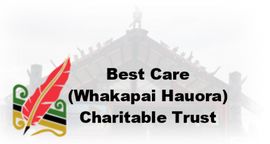MidCentral > GPs / Accident & Urgent Medical Care > THINK Hauora >
Best Care (Whakapai Hauora) Charitable Trust
General Practice (GP) Service, Kaupapa Māori
Today
Covid-19 testing
GP practice - enrolled patients only
This practice provides COVID-19 testing to enrolled patients. Please call the practice for more information.
Description
Whakapai Hauora vision is to be the most proactive, culturally appropriate whānau centred provider of holistic health, disability support and social services for people regardless of age, disability or cultural background in the Manawatū.
We partner with Practice Plus to provide virtual GP services, as an extension of our regular medical centre team.
Staff
Nursing Staff: Sukhi Benipal, Jannah Ali, Denise Marlow, Whitley Weko, Karen Ututaonga
Nurse Practitioner: Jennifer Baur
Matanga Whaiora: Kimiora Stanshall
Health Coaches: Samy Durie-Aranga and Marama Watson
Kaiaawhina (Health Care Assistant) Shiloh Graham
Receptionists: Piri Taimai, Kiri Gillies
Practice Manager: Marema Johnson
Health Management and Quality Control: Dr Carole Fernandez
Doctors
-

Dr Regan Davey
General Practitioner
-

Dr Kathleen Going
General Practitioner - Vocationally Registered
-

Dr Sherine Henriette
General Practitioner - Vocationally Registered
-

Dr Catherine Irwin
General Practitioner - Vocationally Registered
-

Dr Marianne O'Connell
General Practitioner - Vocationally Registered
-

Dr Carina Sue
General Practitioner - Vocationally Registered
How do I access this service?
Enrolled patients, Make an appointment
Enrolling new patients
No
This practice is not currently enrolling new patients.
Fees
Enrolled Patient Fees
| Under 14 years | FREE |
|---|---|
| 14-17 years | $13.00 |
| 18-24 years | $19.00 |
| 25-44 years | $19.00 |
| 45-64 years | $19.00 |
| 65+ years | $19.00 |
Hours
| Mon – Fri | 8:30 AM – 5:00 PM |
|---|
After hours: We partner with Practice Plus to provide same day virtual GP appointments for enrolled patients, as an extension of our regular medical centre team. Practice Plus is available weekdays until 10pm and weekends/public holidays 8am-8pm.
Click here to find out more and to register/ book an appointment.
(Please be aware that some fees may apply when contacting our after-hours providers)
Public Holidays: Closed Labour Day (28 Oct), Wellington Anniversary (20 Jan), Waitangi Day (6 Feb), Good Friday (18 Apr), Easter Sunday (20 Apr), Easter Monday (21 Apr), ANZAC Day (25 Apr), King's Birthday (2 Jun), Matariki (20 Jun).
Preferred urgent care clinic out of hours: The Palms Medical Centre.
Services Provided
Immunisation is the safest and most effective way to provide protection for you and your tamariki’s health. For more information view the NZ immunisation schedule.
Immunisation is the safest and most effective way to provide protection for you and your tamariki’s health. For more information view the NZ immunisation schedule.
- Pregnancy vaccinations
- Childhood immunisation programme
- 45 year old vaccinations
- 65 year old vaccinations
- Adult flu vaccine
- Child flu vaccine
- Diphtheria / Tetanus / Pertussis (whooping cough) vaccine
- Human Papillomavirus (HPV) vaccine
- Measles / Mumps / Rubella (MMR) vaccine
- Meningococcal vaccine
- Shingles vaccine
- Catch-up missed vaccinations
Immunisation is the safest and most effective way to provide protection for you and your tamariki’s health. For more information view the NZ immunisation schedule.
All women and people with a cervix aged 25 – 69 who have ever had intimate skin-to-skin contact or been sexually active should have regular cervical screening. This includes women who have been immunised against HPV. Together, regular screening and HPV immunisation provide the best protection against cervical cancer. There are now more options for how you have cervical screening done: a simple vaginal swab test for HPV, either done yourself or with help from a healthcare professional a cervical sample taken by a healthcare professional (used to be known as a smear test). Talk with your healthcare provider to decide which option is best for you. If HPV is found, you may need to have a follow-up test or be referred directly for colposcopy. If you’ve not yet had HPV testing, you should be screened 3 years after your last test (or 1 year if immune deficient). Once you have had an HPV test, and providing HPV is not found, your next screening will be in 5 years (or 3 years if immune deficient). For more information: Cervical screening | Time to Screen - National Screening Unit
All women and people with a cervix aged 25 – 69 who have ever had intimate skin-to-skin contact or been sexually active should have regular cervical screening. This includes women who have been immunised against HPV. Together, regular screening and HPV immunisation provide the best protection against cervical cancer. There are now more options for how you have cervical screening done: a simple vaginal swab test for HPV, either done yourself or with help from a healthcare professional a cervical sample taken by a healthcare professional (used to be known as a smear test). Talk with your healthcare provider to decide which option is best for you. If HPV is found, you may need to have a follow-up test or be referred directly for colposcopy. If you’ve not yet had HPV testing, you should be screened 3 years after your last test (or 1 year if immune deficient). Once you have had an HPV test, and providing HPV is not found, your next screening will be in 5 years (or 3 years if immune deficient). For more information: Cervical screening | Time to Screen - National Screening Unit
All women and people with a cervix aged 25 – 69 who have ever had intimate skin-to-skin contact or been sexually active should have regular cervical screening. This includes women who have been immunised against HPV. Together, regular screening and HPV immunisation provide the best protection against cervical cancer.
There are now more options for how you have cervical screening done:
- a simple vaginal swab test for HPV, either done yourself or with help from a healthcare professional
- a cervical sample taken by a healthcare professional (used to be known as a smear test).
Talk with your healthcare provider to decide which option is best for you.
If HPV is found, you may need to have a follow-up test or be referred directly for colposcopy.
If you’ve not yet had HPV testing, you should be screened 3 years after your last test (or 1 year if immune deficient). Once you have had an HPV test, and providing HPV is not found, your next screening will be in 5 years (or 3 years if immune deficient).
For more information: Cervical screening | Time to Screen - National Screening Unit
An ECG is a recording of your heart's electrical activity. Electrode patches are attached to your skin to measure the electrical impulses given off by your heart. The result is a trace that can be read by a doctor. It can give information of previous heart attacks or problems with the heart rhythm.
An ECG is a recording of your heart's electrical activity. Electrode patches are attached to your skin to measure the electrical impulses given off by your heart. The result is a trace that can be read by a doctor. It can give information of previous heart attacks or problems with the heart rhythm.
An ECG is a recording of your heart's electrical activity. Electrode patches are attached to your skin to measure the electrical impulses given off by your heart. The result is a trace that can be read by a doctor. It can give information of previous heart attacks or problems with the heart rhythm.
Liquid nitrogen is a fast, effective treatment provided in many practices to treat viral warts, sun damaged skin, skin tags and many benign cosmetic lesions. It comes in a container with a nozzle and is usually applied by swab or spray. Often one treatment is all that is needed but sometimes it may need repeating after two weeks. Because it cannot be stored for too long, you will often find that your GP will treat a number of patients one after the other. For more information click here.
Liquid nitrogen is a fast, effective treatment provided in many practices to treat viral warts, sun damaged skin, skin tags and many benign cosmetic lesions. It comes in a container with a nozzle and is usually applied by swab or spray. Often one treatment is all that is needed but sometimes it may need repeating after two weeks. Because it cannot be stored for too long, you will often find that your GP will treat a number of patients one after the other. For more information click here.
Liquid nitrogen is a fast, effective treatment provided in many practices to treat viral warts, sun damaged skin, skin tags and many benign cosmetic lesions. It comes in a container with a nozzle and is usually applied by swab or spray. Often one treatment is all that is needed but sometimes it may need repeating after two weeks.
Because it cannot be stored for too long, you will often find that your GP will treat a number of patients one after the other.
For more information click here.
Spirometry is a tool that measures how effectively your lungs are working. It is able to show how much air lungs are able to hold (their volume) and how much air can be breathed in and out (inhaled and exhaled) which is called flow. This tool is used to assess damage caused by conditions like COPD (chronic obstructive pulmonary disease – a group that includes bronchitis and emphysema), pulmonary fibrosis, cystic fibrosis and asthma. Results are shown on a graph called a pneumotachograph. For more information click on the following link http://en.wikipedia.org/wiki/Spirometry
Spirometry is a tool that measures how effectively your lungs are working. It is able to show how much air lungs are able to hold (their volume) and how much air can be breathed in and out (inhaled and exhaled) which is called flow. This tool is used to assess damage caused by conditions like COPD (chronic obstructive pulmonary disease – a group that includes bronchitis and emphysema), pulmonary fibrosis, cystic fibrosis and asthma. Results are shown on a graph called a pneumotachograph. For more information click on the following link http://en.wikipedia.org/wiki/Spirometry
Spirometry is a tool that measures how effectively your lungs are working. It is able to show how much air lungs are able to hold (their volume) and how much air can be breathed in and out (inhaled and exhaled) which is called flow. This tool is used to assess damage caused by conditions like COPD (chronic obstructive pulmonary disease – a group that includes bronchitis and emphysema), pulmonary fibrosis, cystic fibrosis and asthma. Results are shown on a graph called a pneumotachograph.
For more information click on the following link http://en.wikipedia.org/wiki/Spirometry
LARC methods are very effective at preventing unplanned pregnancy and are “fit and forget” forms of contraception – you don’t need to remember them every day or every month. LARC methods: Intrauterine Contraceptive Devices (IUCD or IUD) are inserted through the cervix into a woman’s uterus. IUCDs may be either hormonal (Mirena® or Jaydess® ) or non-hormonal (copper IUCD). Jadelle® is a hormone-releasing implant that is inserted just under the skin of the upper arm. Depending on the type of device, it will need to be changed after between three and ten years. Read more about LARC methods here
LARC methods are very effective at preventing unplanned pregnancy and are “fit and forget” forms of contraception – you don’t need to remember them every day or every month. LARC methods: Intrauterine Contraceptive Devices (IUCD or IUD) are inserted through the cervix into a woman’s uterus. IUCDs may be either hormonal (Mirena® or Jaydess® ) or non-hormonal (copper IUCD). Jadelle® is a hormone-releasing implant that is inserted just under the skin of the upper arm. Depending on the type of device, it will need to be changed after between three and ten years. Read more about LARC methods here
LARC methods are very effective at preventing unplanned pregnancy and are “fit and forget” forms of contraception – you don’t need to remember them every day or every month. LARC methods:
- Intrauterine Contraceptive Devices (IUCD or IUD) are inserted through the cervix into a woman’s uterus. IUCDs may be either hormonal (Mirena® or Jaydess® ) or non-hormonal (copper IUCD).
- Jadelle® is a hormone-releasing implant that is inserted just under the skin of the upper arm.
Depending on the type of device, it will need to be changed after between three and ten years.
Read more about LARC methods here
Disability Assistance
Wheelchair access
Contact Details
-
Phone
(06) 353 6385
Healthlink EDI
whakapai
Email
Website
www.facebook.com/profile.php?id=100092218263542&mibextid=ZbWKwL
140-148 Maxwells Line
Awapuni
Palmerston North
Manawatu-Wanganui 4412
Street Address
140-148 Maxwells Line
Awapuni
Palmerston North
Manawatu-Wanganui 4412
Postal Address
PO Box 1341
Palmerston North
Was this page helpful?
This page was last updated at 3:56PM on July 17, 2024. This information is reviewed and edited by Best Care (Whakapai Hauora) Charitable Trust.

